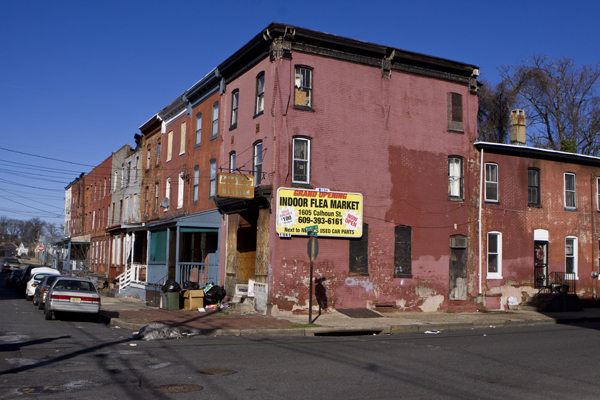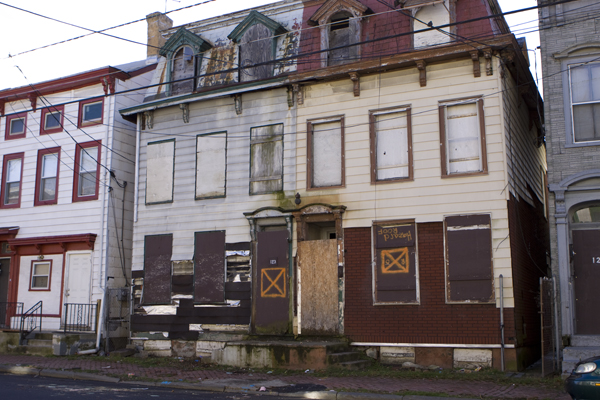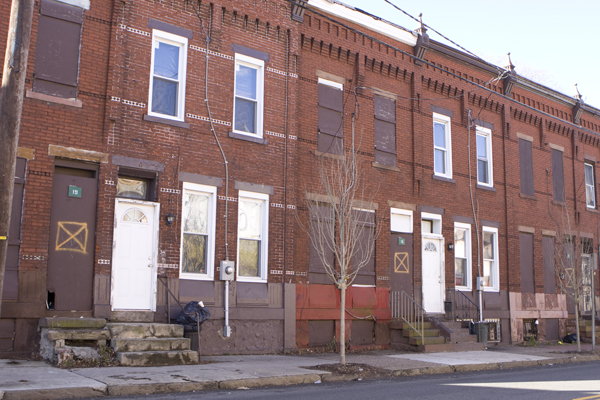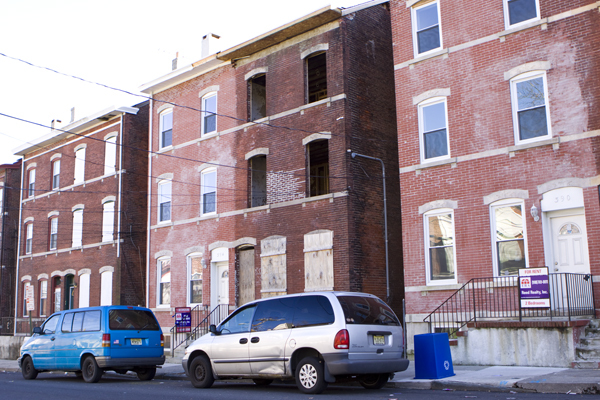Earth Week Day 3: Clean Communities Cover

Trenton, NJ
Commissioner Martin is guilty of rank hypocrisy: celebrating the exact program Governor Christie’s budget is slashing and who’s funding the Governor opposes.
For the third installment in our Christie Earth Week series, we focus on DEP Commissioner Bob Martin KICKS OFF EARTH WEEK WITH TRENTON LITTER CLEANUP:
TRENTON –Department of Environmental Protection Commissioner Bob Martin kicked off a statewide celebration of this week’s 40th anniversary of Earth Day today when he joined a team of youths and adults at Trenton City Hall for the start of the annual Trenton Litter March.
Commissioner Martin provided opening remarks to the group, lauding their efforts as they embarked on a citywide cleanup – one of a host of events taking place statewide this week, which is designated as Environmental Education Week 2010 in New Jersey.
While we’re all for the Trenton Litter March (we marched in the first one in 1987 as a DEP employee, AND we picked up litter), but we feel obligated to point out that the emperor has no clothes. None. Naked.
While I was not at this year’s march, it sounds like Mr. Martin merely spoke at “the start” of the event at City Hall, and didn’t walk Trenton’s neighborhoods and pick up trash (maybe he was afraid of the gangbangers – click on that link to see a racist stunt NJ Senate candidate Martin took right out of the Wallace/Nixon/Reagan “southern strategy” playbook).
There’s an awful lot of green-washing and hypocrisy going on in these events, so we thought we might briefly touch upon important material facts Martin left out of his press release and provide a glimpse of what Martin might have seen had he walked Trenton’s streets.
First of all, Martin failed to note that the Trenton Litter March (and hundreds of cleanup events just like it in communities across the state) is funded by DEP’s Clean Communities Grant Program , which is funded by a garbage disposal tax that goes to the State Recycling Fund. Governor Christie absolutely hates taxes so of course Mr. Martin simply fails to tell taxpayers about the popular and effective programs they get for their money.
Martin didn’t want to talk about taxes or about a Corzine achievement, who’s accomplishments Martin was taking advantage of. According to DEP:
Recycling Enhancement Act Becomes Law
Undoubtedly, January 14, 2008 will long be remembered as one of the most important days in New Jersey’s recycling history for it was on this date that Governor Jon S. Corzine signed into law the Recycling Enhancement Act. This landmark piece of legislation reestablishes a source of funding for recycling in New Jersey through a $3.00 per ton tax on solid waste accepted for disposal or transfer at in-state solid waste facilities. Solid waste being transported out of state, either directly or by railroad, is also subject to the new recycling tax. In such cases, the solid waste collector is responsible for paying the tax. The reestablishment of a funding source for recycling is especially significant, as inadequate funding has been considered one of the key reasons behind New Jersey’s declining recycling rates, which have dropped precipitously over the past decade. The New Jersey recycling community has looked forward to this day ever since the expiration of the recycling tax in 1996 and views the signing of this legislation as a watershed moment in our state’s recycling history.
But Martin had a far more important reason not to disclose the funding source, because Governor Christie’s budget slashes municipal aide, and, worse, it specifically raids $ 7 million from the Recycling Fund (source OLS Analysis of DEP Budget (@page 16)
So Martin is guilty of rank hypocrisy: celebrating the exact program Governor Christie’s budget is slashing and who’s funding the Governor opposes.
Second, Martin dodges the controversy (see: Asbury Park Press story: “Push for DEP to weigh economic impacts creates a stir“) Martin created by his plan to “make DEP a major player in economic development”, appoint an Assistant Commissioner for Economic Development, and fundamentally shift DEP’s mission. (see Asbury Park Press editorial “Aiding economy not DEP’s job“). Note how Martin misleads on this issue by saying DEP’s goals remain unchanged – again, this is no accident (and maybe the harsh Asbury Park Press coverage is why Martin and Christie is doing all these shore events?):
The goals of the DEP, said the Commissioner, are much the same as they were in 1970, namely ensuring clean air and a clean water supply, preserving open space, cleaning up contaminated land, managing solid waste and managing land use.
Third, Martin again rhetorically emphasized his and Governor Chiriste’s “commitment” to the environment, but again leaves out key facts that flat out contradict the claim:
“Governor Christie and I are committed to preserving the environment and natural resources of New Jersey, just as Governor Cahill did when he signed legislation to create the DEP on April 22, 1970″ said Commissioner Martin.
For the record, here are just a few of those inconvenient facts of rollbacks already done (for a longer list, see Sierra Club’s Report on Christie’s environmental record over his first 90 days)
“[DEP Commissioner] Martin’s “fresh look” at DEP science already: 1) killed a proposed greenhouse gas monitoring rule, 2) abandoned a drinking water standard for the chemical perchlorate, 3) twisted the findings of an EPA funded air toxics study in Paterson, 4) moved to gut DEP Vapor Intrusion requirements, 5) issued Administrative Order 2010-3 which delayed and weakened water quality management rules, and 6) signaled to a Court a plan to nix the Highlands septic density standards, the core of water resource and land protection in that region.
Last, here are a few shameful Trenton environmental issues Martin might have seen had he walked Trenton’s neighborhoods – all within a half mile of the Statehouse and DEP building. But to Martin and Christie, these problems are invisible (of course, Martin mouths empty “environmental justice” platitudes). And of course Christie’s budget, housing, transportation, education and social service policies will make these problems of deep poverty, disproportionate negative environmental and public health impacts, and injustice far worse:






